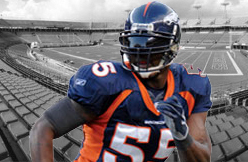Mar/14/12 08:51 AM Filed in:
DJ WilliamsPeter R. Ginsberg, the New York-based attorney representing Broncos linebacker D.J. Williams, Tuesday said the NFL's actions leading to the six-game suspensions of Williams and former teammate Ryan McBean "are much more egregious" than the circumstances involved in Major League Baseball's since-overturned suspension of Milwaukee Brewers star outfielder Ryan Braun.
The NFL ruled that the two players violated the league's performance-enhancing drug policy, based on what the league said was the substitution of "nonhuman" urine samples during August tests.
Williams and McBean, a veteran defensive tackle who became a free agent Tuesday, filed suit against the NFL on Monday in Denver District Court, seeking to force the league to vacate the suspensions levied against the players after their appeals were denied. Four attorneys are listed on the filings — Ginsberg and Marci Gilligan of Denver for Williams; and Harvey Steinberg and Peter Schaffer of Denver for McBean.
"In D.J. and Ryan's case, the NFL violated every guideline for safeguarding and processing a specimen, so that this situation stands apart," Ginsberg said. "The NFL's handling of the specimens was so bad that the specimen collector was fired based of the way he handled our clients' specimens; the finding that the specimen was nonhuman has no validity ... If anybody at the NFL had properly viewed the records, we should have seen that the NFL could not stand behind the test results. I don't think it should have even gotten this far, and taken as long as it has, if the NFL truly was interested in maintaining the integrity of the program."
The filings note that the specimen collector, an employee of Stadium Medical, was fired Oct. 11. The National Center for Drug Free Sport Inc., the administrator of the league's drug-testing program, hired Stadium Medical to collect and analyze the urine samples from Broncos players.
The players' petition to vacate the suspensions cites the recent Braun case, noting his successful appeal of his 50-game suspension primarily because the collector, Dino Laurenzi Jr., stored the sample in his home refrigerator and waited 44 hours to ship it to a Montreal laboratory. The sample was found to have testosterone levels far exceeding allowable levels.
Laurenzi said the delay in shipping the sample was because of the complications tied to international shipping on weekends after the sample was collected Saturday, Oct. 1.
By a 2-1 vote, an arbitration panel granted Braun's appeal, and his suspension was overturned Feb. 25. After reporting to spring training, the reigning National League most valuable player labeled the collection and tracking process of his sample "fatally flawed," and seemed to hint of the possibility of tampering — a reference that drew a pointed response from Laurenzi, who denied any wrongdoing or misconduct.
The Broncos have been involved in another appeal to an NFL drug testing result, after running back Travis Henry was found to have tested positive for marijuana in late August 2007. Henry said that the positive test might have been because of second-hand smoke.
Henry's attorney — Steinberg — argued at a league hearing in November 2007 that procedural mistakes had been made. NFL Commissioner Roger Goodell eventually ruled in Henry's favor.
The Broncos released Henry in June 2008, a month before it was revealed another test had come up positive for marijuana, and he was suspended for a year on Aug. 31, 2008, effectively ending his NFL career.

(denverpost.com)



